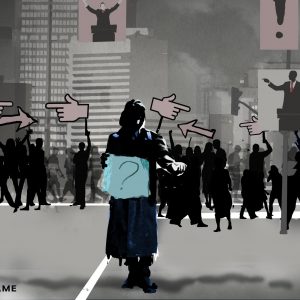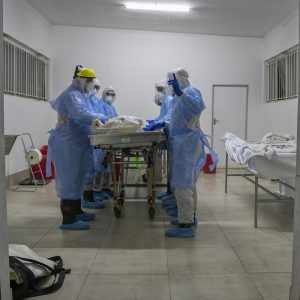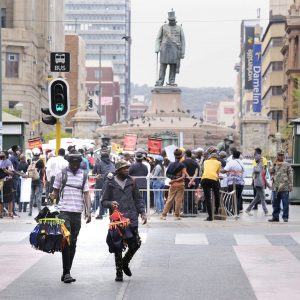Covid-19 Roundup | Level one
South Africans will be allowed to socialise and travel outside the country’s borders as lockdown restrictions are lifted. Meanwhile, undertakers protest and a vaccine trial resumes.
Author:
18 September 2020

Easing restrictions
President Cyril Ramaphosa has announced that the country will be moving to level one of the government’s Covid-19 lockdown at midnight on Sunday 20 September, nearly six months after he announced the initial stringent lockdown in March 2020.
At the peak of the coronavirus infection rate, South Africa was recording around 12 000 new cases a day. “Now, we are on average recording less than 2 000 cases a day,” the president said. “We now have a recovery rate of 89%. Even as restrictions have eased over the last month with our move to alert level two, there has been a gradual, but steady, decline in new infections, hospitalisations and deaths. Demand for hospital beds, ventilators, oxygen and other essential medical requirements has also reduced steadily.
“We have succeeded in overcoming the worst phase of this epidemic while protecting the capacity of our health system,” he added.
Related article:
Ramaphosa did, however, underline the importance of practising strict Covid-19 safety protocols, warning that a second wave of infections had hit countries that had passed the initial peak of the virus, forcing them to reintroduce hard lockdowns.
Level one restrictions allow gatherings that do not exceed 50% of the normal capacity of a venue, the maximum number of people at funerals has increased from 50 to 100, and travel into and out of South Africa will be possible from 1 October.
Covid-19 vaccine trial resumes
On 16 September, the University of the Witwatersrand announced that it had resumed the Oxford Covid-19 vaccine trial. The trial was paused a week earlier after a participant had a negative reaction and fell ill.
AstraZeneca, the company that developed the vaccine in partnership with Oxford University, said it was necessary to temporarily halt the trial, particularly in circumstances where there is a possible illness that cannot be explained.
Related article:
“We are committed to the safety of our participants and the highest standards of conduct in our trials,” the company said on 9 September. Three days later, it announced the resumption of the trial in the United Kingdom.
Wits University said the South African Health Products Regulatory Authority and different South African universities’ ethics committees approved the continuation of the trial in South Africa.
Undertakers protest a lack of diversity
The Gauteng Department of Health assured residents of the province this week that the services of hospital mortuaries would not be affected by striking undertakers protesting outside health facilities.
This comes after funeral operators in the Western Cape brought the N2 in Cape Town to a standstill on Wednesday 16 September. The undertakers placed coffins on the road as a convoy made its way to Cape Town’s city centre.
The protest formed part of a three-day national shutdown of services by the funeral industry led by the Unification Task Team (UTT), which is made up of 17 funeral associations and forums. UTT said it was protesting because the government had not done enough to ensure the industry was transformed and diverse.
Related article:
In Gauteng, acting member of the executive council for health Jacob Mamabolo said: “The department’s forensic pathology services team have been directed to work together with the Gauteng emergency medical services team to assist with the collection of bodies of people who [die] at home.
“We are satisfied with how Chris Hani Baragwanath Hospital is handling the management of bodies during this period.”
Worker’s compensation claims increase
The Compensation Fund said this week that there has been a steady increase in the number of Covid-19 sickness on-duty claims, with the figure currently at 7 199. The bulk of the claims from the fund come from the Western Cape, followed by the Eastern Cape and KwaZulu-Natal.
Related article:
In some instances, incomplete information meant claims were initially repudiated, but fund commissioner Vuyo Mafata said that with sufficient information, applications can still be made for enrolment and adjudication.
The Compensation Fund has administered a majority of the claims, processing 4 595 claims submitted directly to them. Rand Mutual Assurance and the Federated Employers Mutual Assurance Company have dealt with 2 385 and 219 claims respectively. Operating under a licence approved by the Department of Employment and Labour, Rand Mutual has seen a sharp rise in claims particularly related to workers in the steel, mining and iron industries.




